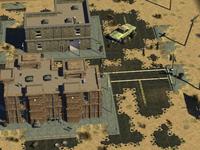|
|
|
Main News Forums Games Games Database Top 100 Release List Support Files Features Reviews Previews Interviews Editorials Diaries Misc Download Gallery Music Screenshots Videos Miscellaneous Staff Members Privacy Statement |
Script Tutorial by Alistair
Contents:
1 IntroductionAt the end of this tutorial, you'll have produced the elements of a mini-mission, where the player has to retrieve a sword for a non-player character. You'll create the quest-setting NPC, the sword, and the necessary dialogues. You'll need the Gothic Mod Devlopment Kit, and a text editor. UltraEdit is the editor recommended by Piranha Bytes. Note that this tutorial doesn't leave you with a stand-alone Mod, it involves modifying actual Gothic game code. Once complete, your new NPC will be part of your Gothic game, albeit not one the other characters are very interested in. Anything written after a // is a comment. If a comment continues onto a second line, you need to start each line with //, to prevent Gothic from treating it as code.
2. The quest-setting characterTo add a new NPC to the game, you need to create a new instance of the class C_Npc. (Bet you wish you'd paid attention in those C++ classes now.) What follows is a short overview of the class, which we'll then fill out with the values for our new NPC. The class: CLASS C_NPC VAR INT id; // an ID number for the NPC VAR STRING name [5]; // The NPC's name VAR STRING slot; VAR INT npcType; VAR INT flags; VAR INT attribute [ATR_INDEX_MAX]; VAR INT protection [PROT_INDEX_MAX]; VAR INT damage [DAM_INDEX_MAX]; DAM_INDEX_BLUNT VAR INT damagetype; VAR INT guild, level; VAR FUNC mission [MAX_MISSIONS]; var INT fight_tactic; VAR INT weapon; VAR INT voice; VAR INT voicePitch; VAR INT bodymass; VAR FUNC daily_routine; VAR FUNC start_aistate;// Here you can give the 'state' which is used when the character is first created. // ********************** VAR STRING spawnPoint; VAR INT spawnDelay; // ********************** VAR INT senses; VAR INT senses_range; // ********************** VAR INT aivar[50]; VAR STRING wp; // *********** VAR INT exp; // Experience points
|
|||||
|
All original content of this site is copyrighted by RPGWatch. Copying or reproducing of any part of this site is strictly prohibited. Taking anything from this site without authorisation will be considered stealing and we'll be forced to visit you and jump on your legs until you give it back. |
||




